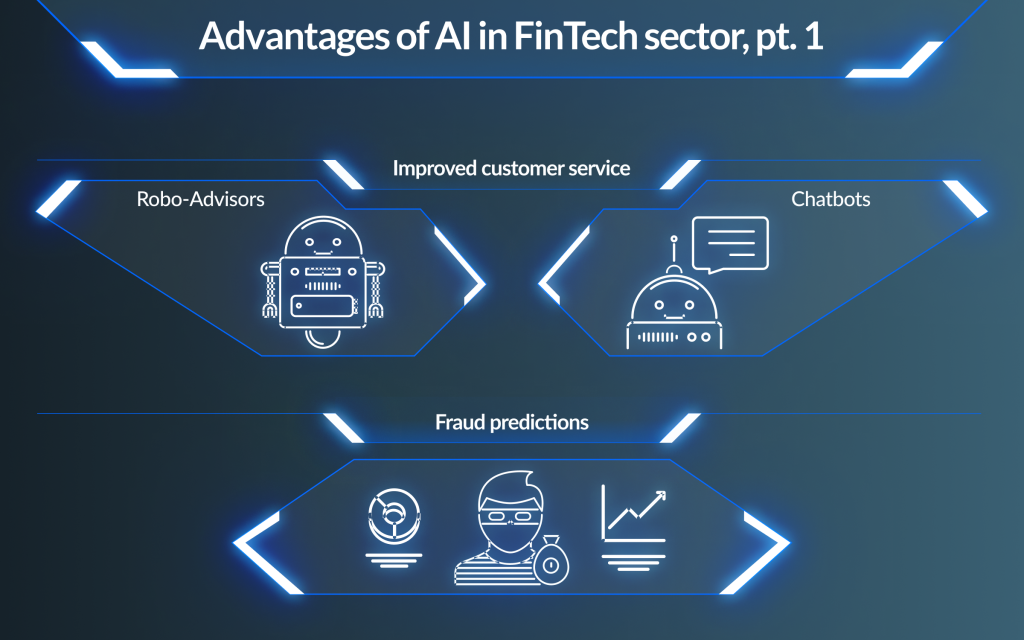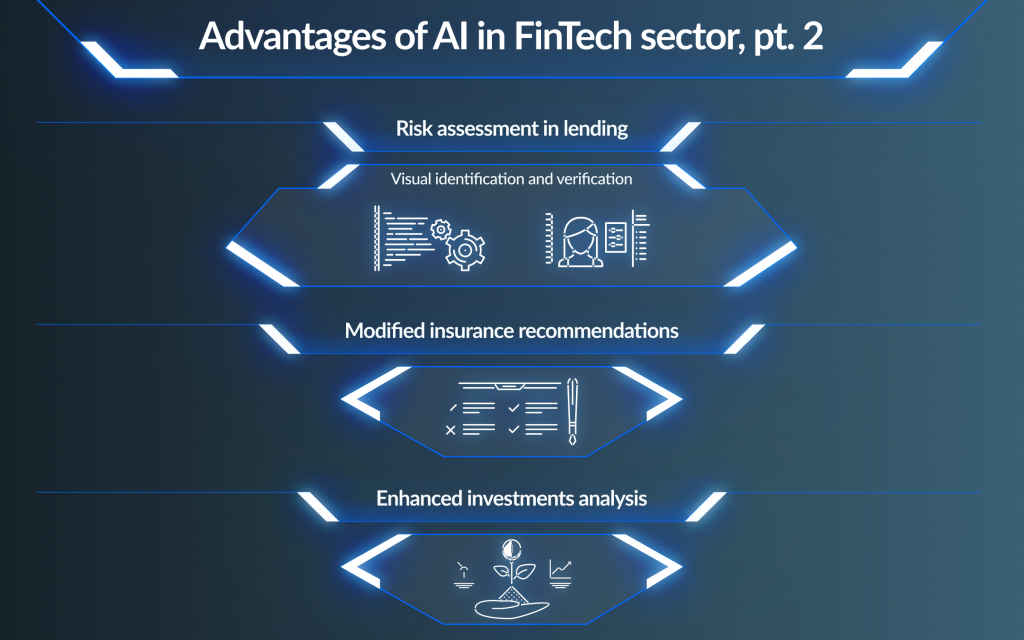The Implementation of AI is becoming more prevalent across various industries. According to Markets&Markets research, AI globalization in the FinTech market is projected to experience significant growth, increasing from 1,337 million in 2017 to 7,305 million by 2025.
Artificial intelligence is currently implemented in financial operations without the knowledge of individuals. It’s used to facilitate the advancement of FinTech while simultaneously addressing its primary obstacles through novel hardware and software.
This article will explore the financial challenges that AI can address and the prospects for FinTech app development to enhance human-machine interaction.
What Business Challenges Does AI Solves in FinTech?
Let’s overview the primary advantages of AI implementation in the finance industry and what improvements this cause.
Solutions AI brings to FinTech, pt.1

1. Advanced user experience
AI in customer service can provide several benefits to fintech companies. The technology allows them to answer users’ questions faster and improve their experience in general. Using 24/7 chatbots helps provide users with almost immediate feedback about their particular requests.
Virtual assistants also help users to orient among all bank’s offerings. They use AI to enhance user data and deliver personalized conversations and calls to action that can increase conversions.
This enables more efficient interactions between humans and customers while providing time-saving services and cost savings on customer service. Furthermore, virtual assistants have improved natural language capabilities, making communication more accessible and intuitive and reducing the risk of misunderstanding or non-responsiveness.
2. Predictions of various fraud
Banking fraud is the biggest problem that the industry face with due to the constant advancement of fraud strategies. Unfortunately, It can be costly and cause significant losses to the institution.
To combat this issue, many institutions are now turning to AI-based analytics tools to detect potential fraud cases. These analytics tools can examine data patterns hinting at suspicious transactions or activities. By monitoring user behavior and any transactions that may seem disturbing, potential fraud cases can be identified quickly with the help of artificial intelligence.
The information these analytics tools determine is passed on to human employees for further review before confirming it as a fraud case. This can reduce time and effort sorting out false positives while ensuring accurate results.
Furthermore, banks and other financial service providers can protect themselves from future fraudulent attempts by remaining vigilant with security measures such as two-factor authentication, better encryption methods for sensitive information, etc. By using such AI-based analytics tools, banks can better understand customers’ behavioral patterns, which could significantly reduce the occurrence of banking fraud in the long run.

3. Better insurance recommendations
The insurance industry is now being on the cusp of transformation due to the advent of cutting-edge technologies like AI and Machine Learning. These advanced methods have been leveraged to construct algorithms that accurately assess real-time risk levels.
Through these automated tools, companies evaluate policies that are more tailored and specialized to individual customers. FinTech applications have also been employed within this space, allowing for financial calculations and analytics for a deeper insight into risk management. In essence, these FinTech tools offer dynamic estimates for premiums based on calculated odds of an event occurring or a potential hazard arising.
Moreover, the motor industry has implemented AI and IoT technology to gain an understanding of how customers drive their cars. Smart contracts, enabled through blockchain technology and AI, are also being explored to enhance vehicle safety features and increase customer insurers’ confidence.
As such, new innovations within the industry via digital technologies allow insurers to provide customers with a more comprehensive approach centered around optimizing coverage offerings specifically suited to their needs, creating a more efficient and reliable insurance process overall.
4. Improved analysis of investments
Hedge funds are investment funds with a private structure that cater exclusively to high-net-worth individuals and investors. The future of hedge funds is looking brighter than ever as they embrace the power of AI to crunch massive amounts of data and elevate their investment analysis. Hedge funds tried to make investments automated with computers, but it didn’t work well. AI was seen as an excellent way to automate FinTech.
AI can potentially automate all stock exchange operations and create a hedge fund without human intervention. AI analyzes market prices and makes daily predictions. An AI system can make informed decisions by analyzing all available options for the current day. Investors have the opportunity to become our customers and enhance their investment process, leading to increased profits.
AI startups in the FinTech industry are worth noting.
Let’s examine the examples of an AI implementation that led to success.
Aire
Aire is a financial technology startup located in London that is relatively new. It was established in 2014 with a focus on assessing the creditworthiness of borrowers with a limited credit history, including those with poor credit. Aire utilizes a questionnaire the user completes and credible sources such as LinkedIn to establish a credit score. The system poses questions to assess the user’s creditworthiness, such as inquiries about their expenditures and income sources. Aire has recently launched its Credit API, allowing other lenders to utilize their system for credit verification purposes.
Kabbage
Kabbage is a fundamental FinTech company that utilizes AI for lending purposes. The service has headquarters in Atlanta, USA, and offers small businesses as well as regular consumers online loans Kabbage uses Big Data analysis and machine learning to predict and develop credit risks model and evaluate portfolios.
Kasisto
Kasisto’s chat assistant utilizes AI for banking applications. The chatbot provides precise answers to customer inquiries regarding finances. The KAI banking platform possesses a vast database of banking-related sentences and substantial banking knowledge. The chat assistant significantly simplifies interactions between users and banks. Kasisto showcases the potential benefits of integrating AI with the banking sphere.
Numeraire
Numeraire is a hedge fund that utilizes algorithms to analyze weekly stock exchange data to identify patterns. Unidentified individuals created the machine learning models used.
The website displays predictions. Numeraire tokens are rewarded for accurate prognosis and can be exchanged for Bitcoins. The platform employs Ethereum smart contracts. Good trades = better algorithms for devs. Numeraire is a cryptocurrency-earning platform.
The list of projects is incomplete, leaving room for potential successful financial startups, including AI FinTech software. Our team of developers possesses the necessary skills to design intelligent financial software for your enterprise.
FinTech and AI: Great Future Perspective for Your Financial Software
Financial Technology and AI integration can transform business financial processes by automating manual tasks, streamlining operations, and increasing progress in financial transactions. As a result, companies are adopting technologies that engage AI to save financial resources and improve user experiences.
AI can aid in predictive analytics and customer segmentation, quickly identifying potential business opportunities. AI is utilized in FinTech to detect and prevent fraud, guaranteeing customer funds’ security and reducing the possibility of fraudulent behavior.
Author’s bio:
Yuliya Melnik is a technical writer at Cleveroad. It is a web and mobile app development company in Ukraine. She is passionate about innovative technologies that make the world a better place and loves creating content that evokes vivid emotions.